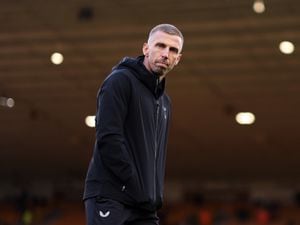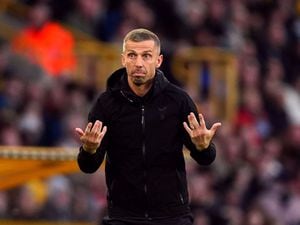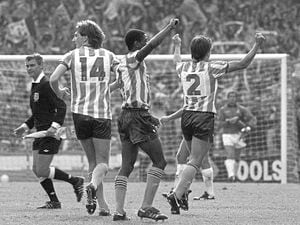From playing Pirlo to psychology – and a one-minute Wolves career for Johnny Gorman
The return of Norwich against Wolves to the Premier League calendar following the Canaries’ promotion is not the first fixture which will bounce off the page for fans when the schedule is released this summer.
But for Johnny Gorman, it will always carry a special significance.
And that is because it was that particular fixture at Carrow Road in April of 2012 that afforded Gorman his one and only taste both of the Wolves first team and the Premier League.
For one minute, plus added time.
Little did Gorman know when entering the pitch as an 89thminute substitute for Michael Kightly that it would be as good as it got during a career he himself describes as ‘unconventional’.
The winger had already, famously at the time, secured nine senior international caps with Northern Ireland giving a slightly new meaning to the ‘club versus country’ arguments which often pervade football.
His senior Wolves bow was merely supposed to be the next rung on the ladder and the next step on the push towards achieving many of his career goals.
It wasn’t to be, and yet there is no regret or rancour. No recriminations. Instead, Gorman, now 28, is able to put it all down to experience. Part of football’s rich tapestry.
“I had already been in a first team squad for a home game, and that was when the kitmen had given me my first shirt with my name on the back,” says Gorman.
“That was a special moment although I didn’t manage to get on the bench.
“Then came the trip to Norwich when four of us young lads travelled – myself, Jack Price, Ethan Ebanks-Landell and Michael Ihiekwe.
“We weren’t sure who was going to make the bench, in the end it was me and Pricey, and then I got the nod to go on.”
It was a disappointing 2-1 defeat for Wolves during a disappointing period overall when they were in the final throes of relegation.
For Gorman however, it was a breakthrough, albeit one which took plenty out of him!
“It felt like a lifetime, I have never been so exhausted after five minutes of running around,” he recalls.
“The adrenalin must have been pouring through me, and when the final whistle went it felt like I had been out there for half an hour.
“Was it a special moment? Yes of course.

“Although at the time I also just saw it as the next step.
“Maybe it was different to a normal debut in that I had already played for Northern Ireland, and it was a great moment, but my pure focus and my mindset was that it was another target chalked off.
“It was only a few years on that I was able to look back and reflect and think how great it actually was.
“At the time it was more a sense of disappointment with what followed and the feeling that I really wanted to make more than one appearance.”
As we speak, all these years on, life is now very different for the affable Gorman.
Now a final year psychology student at the University of Bath – although he intends to stay on for a further year to complete a Masters – Gorman is living in an apartment shared with three other students, also members of the University’s football team.
He even has to break off temporarily to attend to the job of descaling the house kettle. Student life in all its glory.
Turning back the clock to the very first time he moved away from home was in joining Wolves Academy as a 16-year-old, in a unique football club/education link-up that perhaps shaped the early part of this unconventional career.
Born in Cheshire but with a mother from Coleraine, hence the Northern Ireland eligibility, Gorman was first on the books of Manchester City as an eight-year-old, but didn’t greatly enjoy his first foray into academy ranks, not least as he is a Manchester United fan!
And it was United who later spotted Gorman training with one of their satellite centres and after scouting him during several trials and a short stint at Bolton he joined the Academy at the age of 11.
The cast list of his year group at Carrington is fairly impressive.
Jesse Lingard, Michael Keane, Will Keane, Tom Thorpe, Ravel Morrison, Ryan Tunnicliffe, Sam Johnstone, Jay Lynch – many went on to make careers at high levels including internationally.
Gorman even trained with Paul Pogba on several occasions at the start of the Frenchman’s first spell at Old Trafford.
“Usually one or two might make it out of a year group but so many from that group have gone on to have good careers,” he explains.
“Even for me now, it’s nice to see them playing, and to think back that I was a little part of their journey in that team all those years ago!
“Jesse has been doing really well again lately after getting loads of stick for a couple of years, and I just enjoy seeing them play and popping up on Match of the Day and so on.”
Gorman wasn’t destined to follow Lingard towards a first team berth, as by the time he moved into football on a full-time basis, he had moved on, to Wolves.
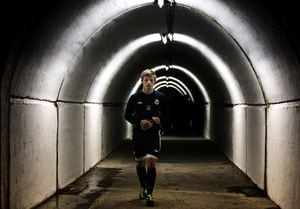
An indifferent year at Under-15 level had prompted United staff to suggest Gorman look for alternatives should an Old Trafford scholarship not be forthcoming, and, with several clubs showing an interest, a potential arrangement with Wolves emerged as frontrunner.
Kevin Thelwell, then Academy Manager but later Wolves Sporting Director, and Tom Statham, a United coach who worked at Repton School, helped facilitate a combination where Gorman was able to follow in the footsteps of several family members by attending the Derbyshire School, alongside his Molineux scholarship.
And so, even when a return to form at Under-16 level saw United offer Gorman a scholarship after all, his heart was already set on Wolves.
“It just came down to where I felt that little bit more wanted,” he recalls.
“Wolves pulled out all the stops for me, which stood out, and it was largely down to Kevin Thelwell at the time.
“It felt like the right decision.
“Of course you can always look back with hindsight and wonder if it was the right call, and think what might have been had I stayed at United.
“But I got to combine my football with three A-levels at a school as prestigious as Repton, met loads of great people and moved away from home for the first time which is an experience and life skill in itself.
“So I don’t look back and regret anything at all.
“I really enjoyed my time at Wolves and, for the most part, it went really well.
“I was integrated with the group really quickly and settled in, and I don’t think there was any resentment from anyone that I was doing my education elsewhere.
“I was in a house with James Spray, who I am still in touch with, all the lads in that group got on really well, and those two years of my scholarship absolutely flew by.”
And, even before signing his first professional contract for Wolves, midway through the scholarship infact, Gorman landed his first senior international cap for Northern Ireland.
It was whilst eating breakfast one morning at Repton, where he studied A-levels in English Literature, Art and PE, that Gorman heard that Northern Ireland boss Nigel Worthington had included him in the squad for the post-season trip to the USA and Chile.
His debut, at 17, the seventh youngest in Northern Ireland’s history and almost two years before appearing for Wolves, came against Turkey, and he was a regular in the squad for the remainder of Worthington’s tenure, picking up nine caps in total including from European qualifiers against Serbia and Italy.
That meeting with the Azzurri in Pescara, almost a decade ago, saw Gorman line up opposite players such as Buffon, Pirlo and De Rossi – he exchanged shirts with the latter.
Surreal? Perhaps. But Gorman was still able to take it all in his stride, just as he did the heightened media activity associated with such a rare and exciting story.
“It is strange to look back now because when I see 17 and 18 year-olds, and young students around University, it just reminds me how young I was when all that was happening,” he recalls.
“I don’t think at that age you are completely developed in your personality and so on, and I can’t comprehend it at times.
“But at the time, it probably just felt that this was what life was like.
“I was fully aware that most 17-year-olds weren’t playing senior football for their country, but it still seemed normal enough, and it has been one of my career aims.
“My mentality was just to make the most of the opportunity, that this was a chance and I just had to take it.
“And the interviews, wow. So many interviews!
“I was still young and new to it all and was obviously a little bit nervous.
“But once I get talking I am always passionate about what I am talking about so maybe that took over from any of the nerves or shyness I was feeling.
“It was strange to think there was so much interest, I suppose it was an unconventional story with me doing my education and then playing for Northern Ireland.
“It’s also funny, as when I left football, I kind of wondered if I would ever be asked to do any interviews again.
“It’s since coming back to University that I have had a few people asking and have done a few and it’s been really nice.
“When I was younger I wouldn’t say I was flippant about it, but it almost felt it was expected, whereas now I am more aware and I savour it a bit more as something to enjoy.”
Talking of enjoyment, while relishing his time at Wolves overall, Gorman’s fourth and final year, beyond that Norwich opportunity, was played out on a much more difficult note.
That fleeting appearance would prove his one and only on the pitch for Wolves and, with Mick McCarthy having departed, and Terry Connor’s time in charge ending at the season’s finale, major changes were afoot.
“Mick had known of me since I had walked through the door at Wolves, he would always speak to me, tell me what I needed to do, and we had an open and positive relationship,” Gorman recalls.
“It was the same with Terry, who gave me my debut, and I can’t thank him enough for that.
“But when they left, the club became a different place.
“Stale (Solbakken) came in with his ideas for a different style of play, and new signings, and that’s football.
“I remember having conversations with people around the club telling me that this was the time to kick on and try and prove myself when we came back that summer.
“But when I came back I never really got a chance and was just back in the reserves and youth team so whatever happened in those conversations, I imagine my name just never came up.”
There began the need for Gorman to try his luck elsewhere, with loan spells at Plymouth, Macclesfield and Cambridge, before a permanent switch to Leyton Orient.
Life at Brisbane Road started promisingly, before the arrival of more senior players curtailed his opportunities, prompting further loan spells, including being part of a Barrow squad which claimed the Conference North title enroute to their now professional status in League Two.
The footballing dream was now diminishing, and for Gorman it was a time to take stock, sit down with parents Mike and Su - both University lecturers - and forge a new plan.
“I found those loan spells difficult, because I went there as an international player with a lot of expectation, when I hadn’t really played any football,” he explains.
“I was going here, there and everywhere trying to find a club – one summer I think I went on ten different trials all over the country and not so long after thinking I could compete for the first team at Wolves I was pretty much on the scrapheap.
“It turned into a really difficult period of my life if I’m honest, and my confidence really dipped.
“I tried the non-league route, hoping to do well at that level and get a move back into the league, but it never really happened, so it got to the stage where I sat down with my parents and the people around me to map out a new future.
“It was a question of either carrying on giving it all to football and seeing what happened or maybe looking at something else that I really wanted to do.
“I was already doing an Open University degree, but that was when I decided to go back to do the full-time degree in psychology.”
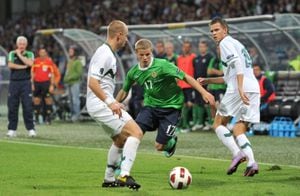
And that carries us up to the present day, with Gorman in his third year at Bath, having now stopped non-league completely but still turning out for the University, whose coach Che Wilson is a former professional himself.
“That gives me my football fix, a game and a couple of training sessions a week, and I would probably miss it if I didn’t play,” Gorman admits.
But now he has very much moved the goalposts in terms of what is ahead.
“I had always been interested in psychology from a young age and Wolves helped me with that as well.
“We had counsellors who came in once a week – Mike Wood and former player Jeff Whitley – as well as a psychologist in Bill Stevens, and I am still in touch with ‘Woody’ even now.
“I remember when I chatted to them I would be talking about me but I was always really interested in how it all worked and was wondering at the back of my mind whether it was something I would be interested in.
“Up until coming to university I was always known as ‘Johnny Gorman the footballer’ and that always used to grate on me just a little bit.
“I would have people coming up to me and just wanting to know about football, which is fine, but I always felt there was more to life.
“Yes I had played football and I really enjoyed it but there are also many other things I am interested in.
“I think you do get stereotyped as a footballer, but now I am here, it is nice to be able to talk about something else and have another string to my bow.”
There is much discussion in football around the difficulties involved for players when they leave the game, ranging from those who are released at Academy level to those who reach the very top, play hundreds of games, and then have no idea what to do next.
Gorman himself has just started a dissertation focused on the impact of coming out of the game for former players and how it affects their identity and their wellbeing.
For many in his position, starting off with international football, then not quite pushing on at club level and a career ultimately stalling, it would have been hugely difficult to deal with.
Gorman admits it was a difficult time, that he lost his sense of self-esteem travelling around the country without being able to prolong his career, and yet he appears to have handled it well.
And now, all of those experiences, the good, the bad and the indifferent, could actually have a positive impact on his future.
“I think I am one of the lucky ones in that I always knew from an early age I might have other options because of an interest in psychology,” he explains.
“If we are going to get philosophical about it maybe this is what was always meant to be.
“Maybe I was meant to go to Wolves and meet the people that I did there, maybe I was meant to have the experiences I had in football and the trials and tribulations, to set me up for this.
“Don’t get me wrong, I would have absolutely loved to have played for Wolves for years and made hundreds of appearances in the Premier League.
“Unfortunately, it just wasn’t meant to be.
“But then it is about taking the positive narrative out of it rather than the doom and gloom of not making it as a professional footballer.
“As much as football was a great thing and a big part of my life, I don’t want that to be the be-all and end-all of what I am known for.
“I’ve now got different ambitions, different goals and aims, and am looking forward to what lies ahead.”
What does lie ahead is the completion of the degree and Masters and then, in Gorman’s own words, “going on to learn the wider implications of psychology”.
Still not completely sure what area he would like to specialise in, he is working with the Bath branch of the Mind mental health charity, and on the mental health ward at Avon and Wiltshire NHS Trust.
And of course. An interest in helping people with their mental health in general may one day lead to a return to sport, and particularly football, given the increasing recognition of the subject’s importance in the modern game.
Gorman may one day be able to work with footballers to improve their wellbeing and their performance, helping them make the small gains that can make such a big difference.
Or even perhaps a role helping clubs overall in terms of an overview on how to get the best out of people on the footballing side – “making sure the cogs are all turning in the right direction”.
There may be much more to learn before that day potentially arrives, and Gorman is keen to soak in as much knowledge as he can, but his rather unique footballing story and associated experiences would certainly be of value in helping those aiming to follow in his footsteps.
Gorman recently featured in an excellent piece on the Premier League’s Today programme focusing on him being one of the 35 players to have technically featured in only one minute of Premier League action.
But who knows? As the future unfolds, maybe that minute on the Carrow Road pitch may not actually prove to be Gorman’s most impressive contribution to the sport after all.


